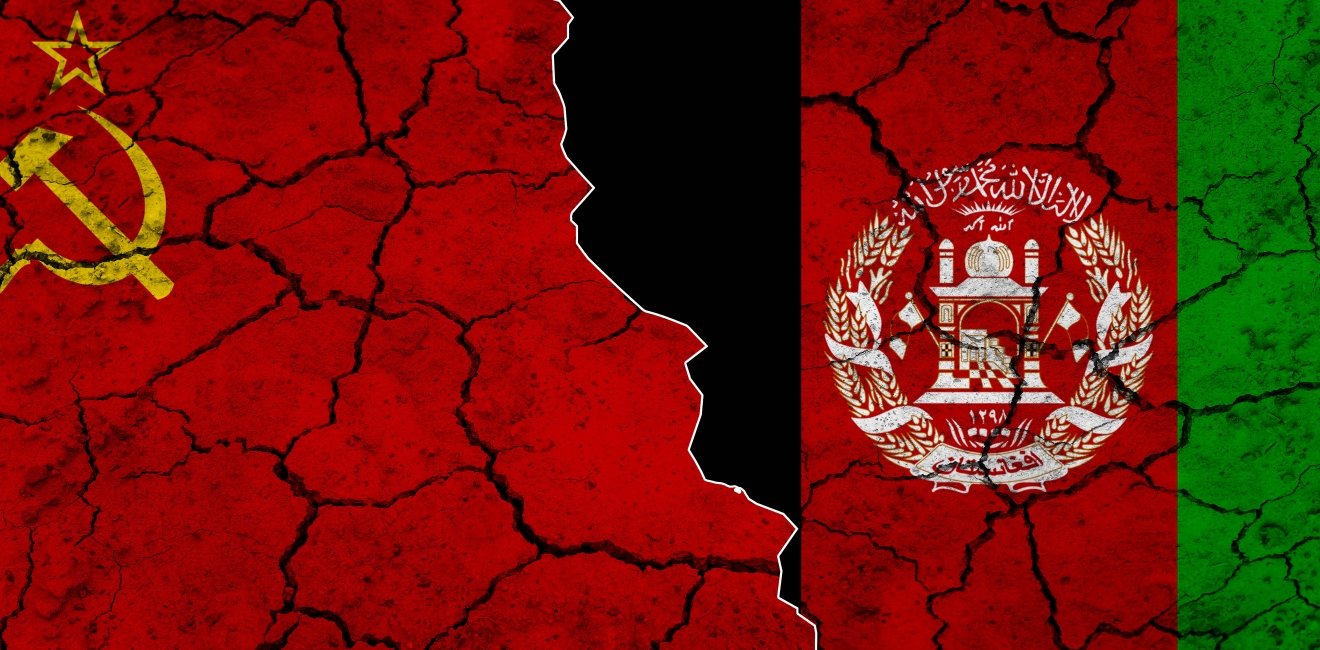
Q: Describe your background and what brought you to the Wilson Center.
Like many kids of the 1980s, my fascination with communism, the Cold War, the Soviet Union, and so on, derived from paranoia and fear, as well as a belief in the infallibility of America’s role in the world. My earliest childhood memories were set against the backdrop of Reagan’s “evil empire” speech, news coverage of the Chernobyl disaster, and the fall of the Berlin Wall. But Hollywood films like Red Dawn and the Rambo series probably did as much as anything to shape my childhood worldview. I sometimes show my students an opening clip from Red Dawn in which Soviet paratroopers launch an all-out assault on a high school in a small Colorado town. The soldiers attack in the middle of a school day for some reason and proceed to fire rocket launchers and AK-47s indiscriminately into the school. Of course, none of the students or teachers is armed. It’s cartoonishly violent and my students usually respond with laughter at the absurdity of it all. But as a child growing up in a mountain town very similar to the one depicted in the film, Red Dawn felt entirely realistic. In the distorted view of my youth, the Soviet Union was above all things concerned with destroying the American way of life, and “socialism,” in all its manifestations, constituted an intrinsic evil. Long after the USSR collapsed, elements of this mentality stayed with me. Indeed, even today, many of my students espouse some version of this mentality, which also continues to inform an important strand of US political thought.
It wasn’t until very late in high school and especially college, when I first studied these issues in any depth, that I came to understand that the Soviet Union, like the United States, was the product of complex social, political, economic, and geopolitical forces; that its political system, peculiar ideology, and antagonistic relationship with Western governments could be understood and explained as a response to very specific historical circumstances; that there was a fundamental disconnect, for example, between the aims of revolutionary socialists of the early twentieth century and the authoritarian system that emerged in Russia in the wake of 1917.
This is a long-winded way of explaining that I ultimately dropped my college specialization in ancient history and chose to pursue Russian and Soviet history in graduate school because it profoundly challenged my long-held Cold War perceptions. This decision, in turn, first brought me to the Wilson Center (Kennan Institute) ten years ago as part of a Ph.D. project on Soviet war memory. The Wilson Center was a natural setting to begin my new book project that deals more directly with the late Cold War issues.
Q: What project are you working on at the Center?
My current book project, “Entangled Defeats: The Soviet-Afghan War and the Shadow of Vietnam,” examines the use and abuse of historical analogies during the 1980s and beyond. Specifically, the project looks at how the Vietnam War becomes a preferred metaphor for the later Soviet war in Afghanistan on both sides of the Iron Curtain.
Throughout the 1980s, the idea of a potential “Soviet Vietnam” became enmeshed in both US and Soviet political discourses. Political, military, and cultural elites looked to the Vietnam War in order to draw lessons for the unfolding Soviet war in Afghanistan. For many American policymakers, the objective became to give the Soviets “their Vietnam War,” to quote the US National Security Advisor at the time. This, in turn, became a project to overcome the so-called Vietnam Syndrome—that is, the widespread aversion to foreign interventions bequeathed by the US defeat in Vietnam. The fact that the US was now supporting local resistance fighters against an invading superpower, one that was itself becoming ensnared in a Vietnam-like military quagmire, played an underappreciated role in vanquishing the sense of post-Vietnam malaise in the United States. At the same time, Soviet officials went out of their way to refute (often in great detail) the notion of a Soviet Vietnam. Nevertheless, many Soviet citizens and soldiers came to embrace aspects of the analogy. Notably, they did so by pointing to the USSR’s own official rhetoric about the Vietnam War.
I should clarify that I am not arguing that the Vietnam and Soviet-Afghan wars were perfectly analogous. Rather, I am trying to explain how and why the idea of a Soviet Vietnam gained traction in both US and Soviet contexts. Whatever the validity of the parallels with Vietnam, such analogizing reflected larger issues about American and Soviet political identities at the twilight of the Cold War. As I have mentioned, on the American side, the ways the Soviet-Afghan War seemed to echo Vietnam played an important role in this process. But the analogy was also significant in the Soviet Union. A surprising aspect of my research has been discovering just how important it was to the Communist Party leadership to engage and discredit the analogy with Vietnam rather than simply ignore it. The realization among many Soviet citizens that the USSR’s anticolonial rhetoric and policies had given way to an imperial adventurism strikingly reminiscent of America’s war in Vietnam presented a real threat to the regime. As late as the withdrawal of its remaining forces in early 1989, the Soviet military issued an official statement asserting for posterity that this war was “nothing like the Americans in Vietnam.” Vladimir Putin recently made a similar point for a Russian television documentary in which he asserted that while “mistakes were made” in the execution of the war, there is no basis to compare the Soviet experience in Afghanistan with the American war in Vietnam. Putin drew on a frequent refrain of communist authorities that the Soviets were invited into the country by the Afghan government, unlike the Americans in Vietnam. All this speaks to the continued salience of the Vietnam analogy, not only in official considerations of the Soviet-Afghan War and its remembrance but also in the evolution of late Soviet and post-Soviet identity politics.
Q: How did you become interested in your current research topic?
At the risk of another long-winded answer, I’ll say that this project builds from themes explored in my first book, The Soviet Myth of World War II: Patriotic Memory and the Russian Question in the USSR (Cambridge, 2021). That book explored the way the myth and remembrance of the Soviet victory in World War II created the conditions for a transcendent “Soviet” sense of identity, one that had the potential of binding Russians, Kazakhs, Uzbeks, Moldovans, Armenians, Latvians, and so on, around a common patriotic ideal. But the book also looked at how the Communist Party leadership reframed past Russian wars in a way that provided convenient martial analogs to convey a uniquely socialist version of patriotism. In other words, the book touched on how the Party utilized historical analogies to reconcile contradictions between Marxism-Leninism and patriotic mobilization.
I found this fascinating and decided to focus my next project on historical analogies. At the time, the US was embroiled in its own war in Afghanistan. I read an account of the US decision to invade Iraq and Afghanistan and was struck by the way policymakers and generals debated by pointing to various historical precedents and analogues. During these discussions, some advisors worried that involvement in Afghanistan could devolve into “another Vietnam.” Those on the other side of the debate offered counter analogies. The idea that historical analogies were informing major policy deliberations, while not surprising, seemed significant. It wasn’t long before I homed in on the Vietnam analogy in the context of the little studied yet crucially important Soviet-Afghan War.
Q: Why do you believe that your research matters to a wider audience?
The intellectual historian Peter Gordon observed that “like common law, the moral imagination works by precedent and example.” Whether we are conscious of it or not, we all use analogies in our everyday lives to make sense of the world around us. We explain this or that thing by reference to a shared understanding of another thing. This is especially true when dealing with events that are difficult to comprehend, such as wars or other national cataclysms. Following 9/11, many in the media and political establishment argued that this was “our Pearl Harbor.” The Pearl Harbor metaphor indicated, on the one hand, that this was a horrific surprise attack on American soil by an external enemy. But it also implicitly suggested a call to war. Just as Pearl Harbor brought the US fully into World War II, so 9/11 paved the way for the unfolding “War on Terror.”
When used in a historically informed manner, analogies can provide insight into present-day issues. But analogies tend to decontextualize events, particularly when utilized for political ends, which can create dangerous blind spots. The political scientist Yuen Foong Khong has demonstrated that, in 1965, policymakers debated sending combat troops into South Vietnam by way of a series of historical analogies: the Munich Conference of 1938, Korea in 1950, and Dien Bien Phu in 1954. The Munich and, especially, Korean War analogies ultimately won out. Munich impelled intervention in Vietnam so as to avoid appeasing and emboldening a hostile aggressor. At the same time, the Korean War analogy influenced the decision to limit combat forces to below what the Pentagon requested. This more limited force, it was hoped, would avoid provoking large-scale Chinese intervention, one of the lessons of Korea. Khong shows that the reliance on historical analogies rendered decision-makers blind to equally important, local Vietnamese factors. The point is that the use and misuse of analogies can have important ramifications.
Among other reasons, I think my project will appeal to wider audiences precisely because it highlights something we don’t often consider: that we all rely on analogical reasoning as we strive to comprehend complex issues. But analogies need to be used with great care. While they can help shed light on present-day challenges, they can also – especially in political contexts – create or reinforce simplistic ideological paradigms within which it becomes difficult to accurately assess, for example, the costs and benefits of a prolonged military intervention. As the US is currently disengaging from its longest-ever war in Afghanistan, the latter point seems particularly germane.
Q: What is the most challenging aspect of your research?
As a historian, my research depends first and foremost on access to archives. The COVID-19 pandemic has made access to many former Soviet and US archives impossible. So, this is the main challenge currently.
However, a potentially greater challenge will be the topic itself. The Soviet-Afghan War is still a highly politicized issue in Russia and many documents relevant to my research remain off-limits to scholars. Moreover, my approach to the topic, and the suggestion that the Vietnam analogy is in any way relevant to the issue of the Soviet-Afghan War, is going to be misinterpreted by some of the people I hope to interview. It is therefore crucial that I am absolutely clear about what I am trying to accomplish. Rather than compare the Vietnam and Soviet-Afghan wars or suggest that the war in Afghanistan was the “Soviet Vietnam,” I am trying to understand how this analogy evolved and what its significance and impact were at the time.
One of the great things about working at the Wilson Center is that it holds some of the most important documents relevant to the Soviet-Afghan War as part of its Cold War International History Project. The same can be said for the Washington D.C.-based National Security Archive. Best of all, these archives are almost entirely digital. So, given COVID, I am fortunate indeed for the past efforts of the Wilson Center and the continued guidance of the Wilson staff as I launch this project.
Q: What do you hope the impact of your research will be?
Recent political disputes in the United States have centered on issues of historical memory, commemoration, and the connection between memory and identity. The legacies of slavery and the Civil War, and efforts to shape public narratives surrounding them, are as relevant today as ever. But historical memory is being contested everywhere, not least of which in Russia and the former communist bloc. It is my hope that my research helps inform and contextualize these disputes. It is, after all, only by recognizing the constructed and always-contested nature of the cultural narratives that shape our lives that societies can properly reckon with the past – the good as well as the bad.
The opinions expressed in this article are those solely of the authors and do not reflect the views of the Kennan Institute.
Author

Assistant Professor of History, Texas A&M University

Kennan Institute
The Kennan Institute is the premier US center for advanced research on Eurasia and the oldest and largest regional program at the Woodrow Wilson International Center for Scholars. The Kennan Institute is committed to improving American understanding of Russia, Ukraine, Central Asia, the South Caucasus, and the surrounding region through research and exchange. Read more







